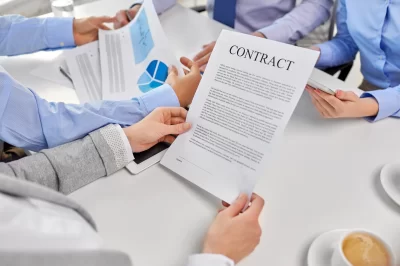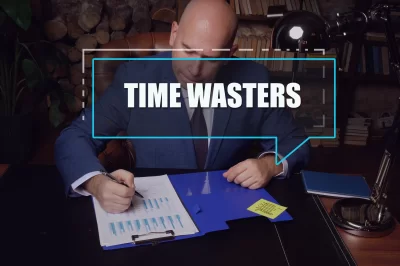10 Questions Buyers Will Ask and How to Prepare for Them

10 Questions Buyers Will Ask and How to Prepare for Them
Selling your business isn’t just about listing it online and waiting for the offers to roll in. Serious buyers will be in full investigation mode, looking for loopholes, hidden risks, and anything that might give them leverage to negotiate a lower price. They want to buy a good business, but they also want to make sure they’re not walking into a money pit.
As the seller, you need to be ready!
Having your documents organised, knowing your numbers, and being able to answer questions confidently can make all the difference in sealing the deal. Delaying any of these questions, will raise concerns with the buyer.
Get Ready for These 10 Questions...
1. Why Are You Selling?
This is usually the first thing a buyer will ask!
For some reason, buyers think that owners will only sell a business because it is struggling. This is usally the mindset buyers have when they enquire and start negotiations. They want to know what the issue is, and can they fix it.
-
Business is Doing Well
If your business is doing well, why are you selling?
Make sure you have a good solid response, practice it and be ready to back it up with evidence. Whether its retirement, change of direction, relocation or desire for change. You need to know your business, be able to showcase its strengths, highlight areas for growth and demonstrate why you are selling.
-
Business is Struggling
If your business is struggling, why should someone buy it?
You need to show why, where it can be improved and the growth opportunities. Not everyone is suited to run a business. A business can thrive under the proper leadership and experience. Say for instance, someone owns a mechanic, but they've never worked in the automotive industry. They may be making big financial mistakes, but someone with experience, can come in and turn it around. Make sure you know your business, the weaknesses and what it needs to improve. You don’t want to sound like you’re running from a sinking ship.
-
Honesty is the Key
Are you burnt out? Struggling with competition? Getting out before things take a turn? - Be honest with your responses. If you hide things at the start, the buyer will eventually find out and you will have wasted alot of time and energy, so be honest!
Be upfront but keep the focus positive - whether it’s retirement, a new opportunity, or just time for a change. If there are challenges, acknowledge them, but also explain the solutions and growth opportunities available to a new owner.
2. Can You Show Me the Financials?
Buyers won’t take your word for it when it comes to revenue and profits. They’ll want to see tax returns, profit and loss statements, balance sheets, and bank records, ideally for the past three years.
If your numbers are messy or inconsistent, it’s going to raise eyebrows. You also need to understand your business debt and payment schedules as the debt matters when your trying to sell.
Get your accountant involved early to clean up your books and ensure everything is accurate. Have an Information Memorandum prepared, summarising key financials and business operations. For serious buyers who put down a deposit, consider setting up an online information vault where they can securely access all the detailed reports they need.
3. How Do You Get Customers?
Client acquisition is so important!
If you as the business owner are the key personal to aquire clients, you could have an issue. If 60% of your revenue is coming from one client - you could have an issue. If the business relies on walk-ins and word-of-mouth - you could have an issue.
A saleable business is easily transferrable.
Remember that! Your business needs to pass onto the buyer seamlessly. Yes, you can be involved in the transition, training and introducing clients. But you need to be able to demonstrate how your business gets its clients and what is the cost of acquisition.
The buyer will want to fully understand your marketing strategies, paid advertising campaigns (Facebook, Google Ads), email marketing, social media, SEO. They will want to know how much money your spending on marketing and advertising. If your business only works because of a large marketing spend and your ROAS is low (under 2). Then you could have an issue.
If you have no real marketing strategy and everything relies on word of mouth, then you could have an issue with transferring the value in the business. Customers could walk away. This affects the value of your business and what a buyer is willing to spend.

4. What’s the Lease Situation?
The lease is so important for retail, hospitality and some service businesses, like mechanics. You need to know your lease agreement inside-out. A bad lease, can ruin a business sale. Especially for businesses that are reliant on foot-traffic or the lease is too expensive and they struggle to cover costs.
Buyers are going to ask you if the lease is transferrable? How long is left? What are the options? Are there rent increases coming? Is a fit-out required? What % of your expenses are going to the lease.
One issue we commonly see are lease agreements that are too expensive. When the business first opens, they have no issues covering the lease, as there is a lot of hype around the new business. As time passes, the hype dies down and so do sales. This is when businesses hit an issue. The landlord will continue to take their rent and the business will struggle to meet it. The same thing happens, if a new business opens nearby with similar offerings (e.g. a cafe) and there are less customers to support the business.
So know your lease, know the issues, know the ways to tackle the hard questions. Buyers will uncover this during the due diligence process, so be upfront.
5. What’s the Competition Like?
Buyers don’t just look at your business in isolation, they look at the whole market. They’ll ask:
- Who are your main competitors?
- What sets you apart?
- Is the industry growing or shrinking?
- Have new players entered the market?
They’re looking for threats. Be ready to discuss how your business is positioned to handle competition. They dont want a wishy-washy answer. They will want numbers. Growth %, market share, future predictions. If there is going to be a shift in the market, they want to know about it. If you try and hide it, they will usually eventually find out. So going back to point 1 about 'reason for sale' - be honest!
6. How Much Do You Work in the Business?
If the business is being sold on a multiple of net earnings or maybe an EBITA or EBIT. Knowing the owners involvement is crucial - especially in small business.
A business is more saleable if the owners hours are clear or they have management in place. The buyer will ask you questions about your weekly hours, daily schedule, how involved in the operations you are and when you last took a holiday.
I once spoke to a business broker and this was the key to her best sales. She used to advise the business owner to take a 3 week holiday from the business. To go away, leave it in the hands of the team and see what happens. This not only allowed them to see the issues in the business, but was also a great way to demonstrate to the buyer, that it is possible for the business to run with the owner away. This could be something you could consider, before you start to advertise and sell your business.
7. What’s the Biggest Risk in This Business?
A buyer will try to uncover weaknesses. Every business has weaknesses. Maybe your in a niche industry that requires a speaclised skillset, like a Dentist, maybe there is a shortage of dental nurses in the market. It could be risky find staff for the business.
Instead of being defensive, be proactive. Identify potential risks and explain how they can be managed. If you’ve already put steps in place to reduce risks, highlight those measures.
8. How Are the Staff?
“Great things in business are never done by one person; they're done by a team of people.” — Steve Jobs
Your business depends so much more on your team, than you. Especially when you are selling. As the owner you will be walking away, and your team will stay and continue to run the business. The buyer will want to know about your team, the contracts, key personal, risk of them leaving, skill specialistion and so on.
Having contracts and incentive plans in place can help reassure buyers.
9. What’s Included in the Sale?
Well this is a pretty obvious question. What you need to do as the owner is to have everything organised, well before the buyer enquires. We have a checklist to help you get started.
10. What Happens After the Sale?
The buyer may want you to stay on for a transition period. Decide in advance how much involvement you’re willing to have post-sale.
Potential Extra: Is There Vendor Finance?
This question has come up alot, post covid. So talk to your advisors and decide if you are willing to offer vendor finance and the terms. Be firm on your response.
They Key is to be Prepared and Stay Organised
Selling a business isn’t just about having the right answers - it’s about being organised.
- Have an Information Memorandum ready for buyers who enquire.
- Once a deposit is paid, provide access to an online vault with financials, contracts, and key documents.
- Work with an accountant and solicitor to ensure all paperwork is accurate and complete.
The more prepared you are, the smoother the process will be. Buyers will appreciate transparency, and you’ll reduce the chances of deals falling through.
For more insights into selling a business, check out 7 Mistakes Business Owners Make When It’s Time to Sell.
Tags: selling a business exit strategy
About the author

Vanessa Lovie
CEO Bsale Australia
Vanessa is the current manager and CEO of Bsale Australia. Over the past 11 years as a business owner, she understands what it takes to grow a ...









